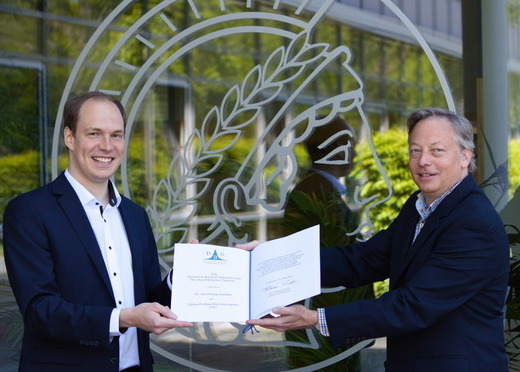Jan-Philipp Günther wins the Agnes Pockels Ph.D. Award
- 25 June 2021
- Stuttgart
- Micro, Nano, and Molecular Systems
Jan-Philipp Günther has won the 2021 Agnes Pockels Ph.D. Award, which is awarded annually by the German Bunsen Society for an outstanding doctoral thesis in the field of physical chemistry.
Stuttgart/ Frankfurt am Main – Jan-Philipp Günther has won the 2021 Agnes Pockels Ph.D. Award, which is awarded annually by the German Bunsen Society for an outstanding doctoral thesis in the field of physical chemistry. The prize commemorates Agnes Pockels, who was born in Braunschweig in 1862 and quietly developed into a successful physical chemist as an autodidact. At the end of her life in 1935, she nevertheless received the recognition she deserved for her pioneering work on interfacial and surface chemistry. She was the first woman to be awarded the honorary doctorate of Dr. Ing. h. c.. With this award, the German Bunsen Society recognizes both the long struggle of scientists for recognition in their disciplines and the scientific achievements of young physicochemical scientists. The awardees are selected after a written evaluation round during a lecture session at the Bunsen Meeting, which took place in May 2021. Under the current conditions, the finalists presented their work online, as they also did last year.
The award means a lot to me and I am very happy about the appreciation of my work and the work of the many people who supported me," says Jan-Philipp Günther, now a former Ph.D. student in the Micro, Nano and Molecular Systems research group at the Max Planck Institute for Intelligent Systems. He received his doctorate from the University of Stuttgart. "The fact that the prize is dedicated to Agnes Pockels makes me very happy. I am honored, because her story is so special. As a woman she was denied access to a scientific education, but nevertheless made breakthroughs in surface chemistry as a self-taught scientist and was honored late in life for her extremely important work."
Jan-Philipp Günther's talk and the topic of his doctoral thesis are titled "Advanced Diffusion Studies of Active Enzymes and Nanosystems." It is about enzymes – fascinating biochemical nanomachines, which catalyze many reactions that are essential for life. The study of enzymes is therefore very important in biological as well as medical contexts, but the catalytic potential of enzymes is also applied in organic synthesis. This research addresses the fundamental question of whether the catalytic reaction of an enzyme or molecular catalyst can cause it to exhibit enhanced diffusion. Diffusion measurements were performed using advanced measurement methods of fluorescence correlation spectroscopy (FCS) and diffusion nuclear magnetic resonance (NMR) spectroscopy. The measurement results led to the detection of artifacts in FCS measurements of enzymes and molecular NMR measurements, thus seriously challenging several recent publications claiming that enzymes and molecular catalysts are active matter and exhibit enhanced diffusion. In addition to these fundamental questions, the use of enzymes as biocatalysts is also investigated in this work. A novel nanoconstruct - the enzyme-phage-colloid (EPC) - that uses filamentous viruses as a link between enzymes and microparticles is presented. EPCs can be used for biocatalysis with simple magnetic recovery of enzymes and can drive enzymatic micropumps. The latter can autonomously pump blood using the naturally occurring urea in it and could therefore be of interest for medical applications.
Explaining why Jan-Philipp Günther's research convinced the jury, an award certificate reads: "The award is in recognition of his fundamental work in understanding enzymatic reactions as driving forces of diffusion processes and the successful use of pulsed-field gradient NMR to describe them quantitatively." The award jury thus recognizes the scientific quality and originality of the doctoral thesis carried out by Jan-Philipp Günther at the University of Stuttgart and the Max Planck Institute for Intelligent Systems in the group of Prof. Dr. Peer Fischer. He is the lead author of the first diffusion NMR measurement performed on active enzymes (Journal of Chemical Physics), as well as three other publications, which contributed to his Ph.D. thesis.
Jan-Philipp Günther would like to continue working in the physical chemistry research field after his doctorate. While he is currently finishing some projects in his research group as a postdoc, Jan-Philipp Günther plans to do another postdoc in Germany or abroad.
Jan-Philipp Günther
Peer Fischer
enzymatic reactions
University of Stuttgart
Max Planck Institute for Intelligent Systems
Nanosystems
Agnes Pockels



